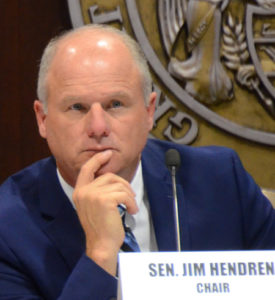
By Steve Brawner, © 2019 by Steve Brawner Communications, Inc.
Remember how we all woke up and realized the country faces an opioid crisis? Another health crisis is brewing: the skyrocketing use of e-cigarettes by young people. For the next few weeks, the question will be, what should Arkansas do about it?
First, the crisis.
For decades, society has successfully reduced tobacco use. The Centers for Disease Control and Prevention said last year that 14 percent of American adults smoked cigarettes, down from 42.4 percent in 1965. According to the Campaign for Tobacco-Free Kids, only 7.6 percent of high school students nationwide smoke. In Arkansas, it’s 13.7 percent.
Then these vaping products – which contain nicotine and other harmful chemicals – were introduced. They’re new and sleek and have fruity flavors, and a lot of kids are using them. More than 3.6 million middle and high school students used e-cigarettes in the past 30 days last year, according to the CDC and the Food and Drug Administration. About 1.5 million more American young people used e-cigarettes in 2018 than in 2017.
The industry leader, Juul, had 68 percent of the vaping market in June 2018. Juul brands itself as being a safer alternative to cigarettes that can help adults stop smoking, but the product obviously appeals to kids, and then they’re addicted.
Decades of anti-tobacco efforts are being undone. Many young people could end up hooked on these e-cigarette products like their grandparents were hooked on cigarettes. An Arkansas school superintendent told me vaping has become a big issue. One high schooler who twice was caught vaping and faced being disciplined apologized, saying he hated to admit he was addicted.
So what should the state do (considering we can pretty much write off Congress doing anything)?
One response is to make it illegal for young people to buy the products. House Bill 1565 by Rep. Andy Davis, R-Little Rock, raises to 21 the legal age for purchasing tobacco and e-cigarette products. It’s working its way through the process and appears headed toward the governor’s desk.
That would help. However, we all know making something illegal won’t stop all young people from using it.
The other response is to raise the price, the easiest way being to raise taxes. While Arkansas taxes cigarettes at $1.15 per pack, e-cigarette products are subject only to the same sales tax as other non-food products.
On Thursday, Senate President Pro Tempore Jim Hendren, R-Sulphur Springs, along with Democrats and Republicans from the House and Senate unveiled Senate Bill 571, which would levy an additional 20 percent tax on cigarettes – about 80 cents a pack – and would equalize e-cigarette taxes with those of tobacco products other than cigarettes. That would be about a 67 percent tax. The money raised would offset tax cuts for lower- and middle-income taxpayers.
Hendren has been talking about raising tobacco taxes for months, ever since the Arkansas Center for Health Improvement said the state’s Medicaid program spends $795 million annually to treat tobacco-related illnesses in adults ages 30-65, but tobacco taxes raised only $230 million. He believes nonsmoking taxpayers shouldn’t subsidize tobacco’s health costs.
Meanwhile, earlier this session, legislators cut taxes for wealthier Arkansans while raising gas and diesel taxes, which hit lower- and middle-income people the hardest. This would balance some of that out.
As president pro tempore, Hendren is the Senate’s leader and a close ally of Gov. Asa Hutchinson, his uncle. His leading the effort improves its chances of passing. Tying cigarette and e-cigarette revenues to tax cuts for lower- and middle-income Arkansans was smart politics.
But almost all tax increases are politically challenging. Tobacco taxes are hard because of the tobacco industry’s efforts, because so many stores sell the products and pressure their legislators, because so many voters use the products, and because some legislators don’t want to target a legal behavior in a free country.
Regardless of what happens in the Capitol, if you haven’t been paying attention to this issue, start. Because while we adults were looking in the other direction, for many young people, nicotine became cool again.
“He [Senator Hendron] believes nonsmoking taxpayers shouldn’t subsidize tobacco’s health costs.”
Vaping is not smoking. E-cigarettes and vapor technology contain no tobacco and as the Royal College of Physicians and Public Health agree are at least 95% less harmful than traditional combustible tobacco cigarettes. It would be public health and political malpractice to penalize adult smokers with additional cost in extra taxes because they made the choice to switch to a less harmful e-cigarette alternative. Think about the kids. Allow their parents to have a less expensive and more attractive alternative to their nicotine habit so they can have more quality years with their children.
“He [Senator Hendron] believes nonsmoking taxpayers shouldn’t subsidize tobacco’s health costs.”
Vaping is not smoking. E-cigarettes and vapor technology contain no tobacco and as the Royal College of Physicians and Public Health agree are at least 95% less harmful than traditional combustible tobacco cigarettes. It would be public health and political malpractice to penalize adult smokers with additional cost in extra taxes because they made the choice to switch to a less harmful e-cigarette alternative. Think about the kids. Allow their parents to have a less expensive and more attractive alternative to their nicotine habit so they can have more quality years with their children.
How lame and predictable that you’d ignore all the evidence that vaping has helped adult smokers quit, as well as the testimony of adult-only vape shops that would be shut down if this insane tax goes through. Shame on you.